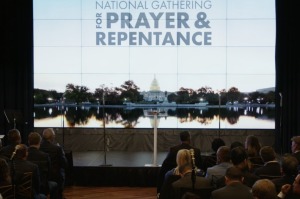3 things Prince Harry's memoir 'Spare' reminds us as Christians

Like millions of people around the globe, I’ve found myself lured into reading Prince Harry’s recently published memoir Spare. I’m more than halfway through the book now, and thus far, it’s both riveting and reticent, emotional and stoic, spellbinding and wearisome too. But whatever you view on the book, one thing has become astoundingly clear. The journalistic spectacle surrounding its publication as well as the relentless attention given to two feuding brothers has caused seemingly everyone to take a side — for or against. And the two sides are as vehemently divided as the royal House of Windsor itself.
If ever there was a good time to remind believers of God’s desire for unity, perhaps it is now. After all, we’ve all experienced disunity in some form or fashion. We’ve faced conflict with a parent or sibling, disagreements with coworkers or neighbors, squabbles between church members, even personal struggles with God Himself. Consider Jacob who wrestled with the Lord until daybreak (see Gen. 32:24-30).
To experience conflict is to be human.
Still, God does not leave us without guidance on this subject. In fact, He calls those who follow Him to a higher plateau, a narrower way that is counter-cultural to what we’ve seen unfolding lately in secular news reports and biting editorial columns. God calls Christians to pursue unity extravagantly amongst believers, and He calls us to pursue peacemaking, as much as humanly possible, with nonbelievers too (see 1 Cor. 1:10, Phil. 2:2-3, Rom. 14:9, and Matt. 5:9). Unity and peacemaking are two of God’s priorities because both offer the world a clearer canvas on which the Gospel message can be painted. Both offer irresistible hope that a loving God is real, that restoration is possible, and that Jesus really did die so we might experience the ultimate reunification — eternal life through the forgiveness of our sins.
In spite of God’s decree, seeking unity does not come without difficulty. Therefore, here are three things to remember in your personal pursuit of unity and peace:
1. God doesn’t take sides, yet He deeply cares about our conflicts. In Joshua 5, right before the great battle of Jericho, an angelic figure (or arguably God incarnate) stands in front of Joshua with a sword in his hand. Joshua asks this figure, “‘Are you for us or for our enemies?’” (Jos. 5:13). The angel’s reply is simple. “Neither.” For us today, God would arguably respond the same way. He is not for one side at the expense of the other. He doesn’t take sides. Rather, God has a bigger plan, a greater purpose in mind that goes beyond what we often see or understand. We can trust, therefore, that even when things aren’t going our way, God deeply cares about our struggles. He sent His Son into a conflict-filled fallen world to die, yes, but also to live so that we might see firsthand how much the suffering we face from conflict and sin really do matter to Him.
2. God commands unity, but unity doesn’t equal uniformity. In Romans 12, Paul famously expounds on his analogy of the Church as “one body with many members” (Rom. 12:4). Each piece and part of this “body” has an individualized purpose and function. The eyes see, for example. The ears hear. The feet walk. The hands carry. No two parts of the human body are meant to be alike, just as no two people are expected to be alike in God’s church. Unity is not uniformity, according to scripture. Differences of personality, opinion, method, style, and even theological leaning will exist. We should expect it. We should also expect to embody compassion and humility in a way that values our uniqueness while celebrating our interconnectedness. In other words, we should radically strive for harmony and partnership, not division and discord.
3. Even without resolution, God promises to be with those who continually seek peace. One of the most misquoted scriptures in the entire New Testament is Matthew 18:20 — “For where two or three gather in my name, there I am with them.” Often Christians share this verse to reassure one another of God’s presence, his intimacy and closeness in times of need. This isn’t theologically incorrect. However, in its fuller context, this verse is the culmination of Jesus’ practical teachings on how to deal with conflict. In context, its meaning expresses something even richer: God is near to those who are willing to have difficult conversations, who pursue forgiveness, who seek reconciliation. But what about those who won’t reconcile, you might ask? The underlying message of Matthew 18:15-20 also answers that question. We can establish boundaries, but we are to still treat people as we would any unbeliever — with kindness, generosity, mercy, and respect.
A.W. Tozer, in his popular book, The Pursuit of God: The Human Thirst for the Divine, puts it best. He writes, “Has it ever occurred to you that one hundred pianos all tuned to the same fork are automatically tuned to each other? They are of one accord by being tuned, not to each other, but to another standard to which each must individually bow.” Perhaps if we all took Tozer’s advice and daily tuned ourselves to Christ, we’d unwittingly be meeting God’s other desire. We’d unify, being more in tune with each other too.
Ginger McPherson is a pastor’s wife, Bible teacher, and devotional writer for Journey Magazine and The Joyful Life Magazine. She holds a Ph.D. in English from Baylor University and currently resides in Oklahoma where her husband serves as one of the pastors at First Baptist Church of Tulsa. Connect with her on Instagram or at glmcpherson.com.




























